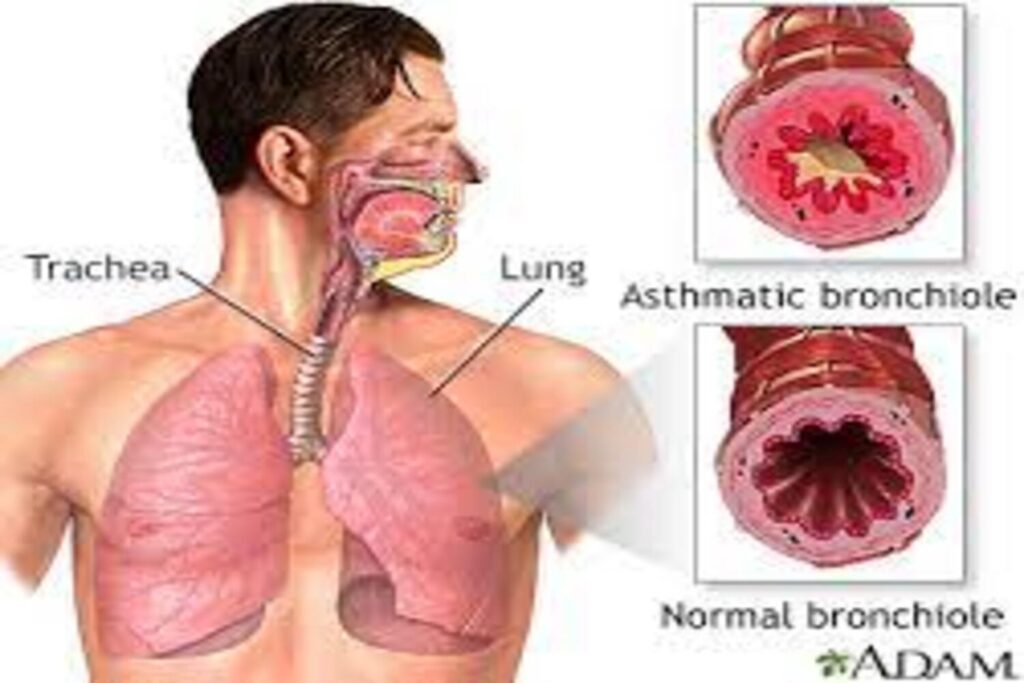SIMPLE AND NATURAL WAY TO FLUSH OUT ASTHMA AND ANY FORM OF COUGH COMPLETELY AND PERMANENTLY OUT OF YOUR BODY SYSTEM REGARDLESS OF THE AGES
THIS IS 100% PERMANENT CURE TO ASTHMA REGARDLESS OF AGES.
Asthma is a condition in which your airways narrow and swell and may produce extra mucus, which can make breathing difficult and trigger coughing. Coughing is the body’s way of trying to remove whatever is irritating the lungs. While people with asthma often experience a whistling or wheezing sound in the chest in addition to coughing, there is a form of asthma in which the only symptom is a chronic cough. This is known as cough-variant asthma.
It’s more likely to be asthma if your cough is accompanied by other asthma symptoms, like wheezing, breathlessness or chest tightness.. If your cough it’s usually dry, or someone with uncontrolled asthma might have thick clear mucus when they cough.
Asthma is a chronic disease that causes the airways of the lungs to swell and narrow. It leads to breathing difficulty such as wheezing, shortness of breath, chest tightness, and coughing.
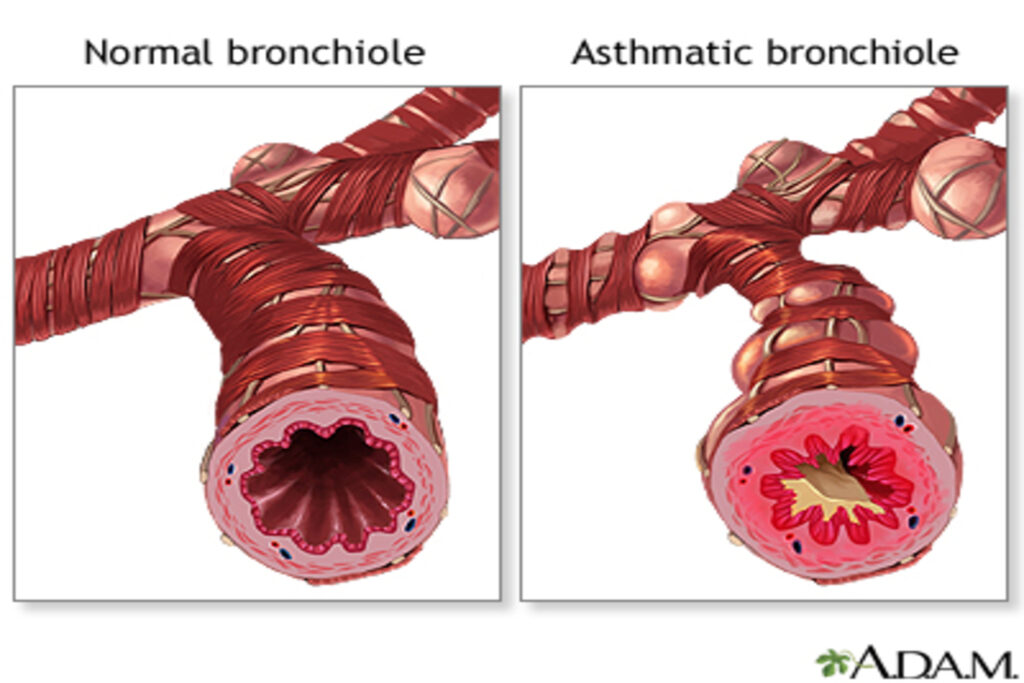
ASTHMA IS A DEADLY DISEASES THAT KILL FASTER THAN ANY AILMENT
Do you know an asthmatic patient may not leave more than 3 years if not urgently treated.
Asthma causes lung cancers
Asthma is a common chronic lung disease characterized by chronic inflammation, reversible airway obstruction and enhanced bronchial reactivity. The chronic inflammatory state of the lung among those with asthma has been suggested to cause oxidative injuries that may lead to lung cancer development, which can be life threatening, and can eventually lead to death if not urgently treated.
However, when asthma is not treated or poorly controlled this can lead to problems, such as feeling tired, stress, anxiety or depression, lung infections and delays in growth or puberty in children. Poorly controlled asthma can also lead to severe asthma attacks which can be life threatening.
Percentage of asthma in nigeria
The prevalence of asthma and allergic rhinitis in Nigeria is high with variabilities across regions and age groups. The number of persons with clinical asthma in Nigeria (approximately over 13-15 million) is likely to rank among the highest in Africa.
Asthma, According to the latest WHO data published in 2020 Asthma Deaths in Nigeria reached 8,192 or 0.55% of total deaths. The age adjusted Death Rate is 10.71 per 100,000 of population ranks Nigeria #58 in the world. Over 80% of asthma-related deaths occur in low-and lower-middle income countries.
Each day 11 Americans die from asthma. There are more than 4,000 deaths due to asthma each year, many of which are avoidable with proper treatment and care. In addition, asthma is indicated as contributing factor for nearly 7,000 other deaths each year
National Prevalence of Asthma Attacks1 Among People With Current Asthma2 by Age (2020)
Characteristic Weighted Number With Asthma Attack1 Percent (SE)
Total 10,342,170 41.0 (1.24)
Children (Age <18 years) 1,803,554 42.7 (3.06)
Adults (Age 18+ years) 8,538,616 40.7 (1.29)
How does asthma occur in the body
Asthma is a long-term condition affecting children and adults. The air passages in the lungs become narrow due to inflammation and tightening of the muscles around the small airways. This causes asthma symptoms such as cough, wheeze, etc. The airways are tubes that carry air in and out of your lungs. The airways becomes inflamed and narrowed at times. This makes it harder for air to flow out of your airways when you breathe out.
PNEUMONIA
Pneumonia is an infection that inflames the air sacs in one or both lungs. The air sacs may fill with fluid or pus (purulent material), causing cough with phlegm or pus, fever, chills, and difficulty breathing
It is mostly spread when people infected cough, sneeze or talk, sending respiratory droplets into the air. These droplets can then be inhaled by close contacts. Less often, you can get pneumonia from touching an object or surface that has the germ on it and then touching your nose or mouth.
Pneumonia can be very serious and even deadly. You are more likely to have complications if you are an older adult, a very young child, have a weakened immune system, or have a serious medical problem like diabetes or cirrhosis, Etc
SYMPTOMS OF ASTHMA
Whenever you are feeling the following signs in your body system, kindly bear in mind that asthma is in your body system. The signs include the following:
- Shortness of breath.
- Chest tightness or pain.
- Wheezing when exhaling, which is a common sign of asthma in children.
- Trouble sleeping caused by shortness of breath, coughing or wheezing.
- Coughing or wheezing attacks that are worsened by a respiratory virus, such as a cold or the flu.breathing faster.
- A fast heartbeat.
- Drowsiness, confusion, exhaustion or dizziness.
- Blue lips or fingers.
- Fainting
Causes of asthma cough
- Infections like sinusitis, colds, and the flu
- Allergens such as pollens, mold, pet dander, and dust mites
- Irritants like strong odors from perfumes or cleaning solutions
- Air pollution such as burning bush
- Tobacco smoke
- Exercise
- Cold air or changes in the weather, such as temperature or humidity
- Gastroesophageal reflux disease (GERD)
- Strong emotions such as anxiety, laughter, sadness, or stress
- Medications such as aspirin
- Food preservatives called sulfites, found in things like shrimp, pickles, beer and wine, dried fruits, and bottled lemon and lime juice
WHAT ARE THE THINGS THAT TRIGGERS ASTHMA
An asthma attack can be triggered by a number of things. Asthma triggers can vary by person to person, so it’s important to know what yours are. Some common triggers include:
- allergens, such as pollen, mold, or pet dander
- air pollution
- Smoking
- cold weather
- exercise
- irritants, such as dust, perfumes, or chemical fumes
- respiratory illnesses, such as the flu or a cold
- Obesity
Process of asthma
The processes of asthma include:
- Bronchoconstriction. In asthma, the dominant physiological event leading to clinical symptoms is airway narrowing and a subsequent interference with airflow. …
- Airway edema. …
- Airway hyperresponsiveness. …
- Airway remodeling
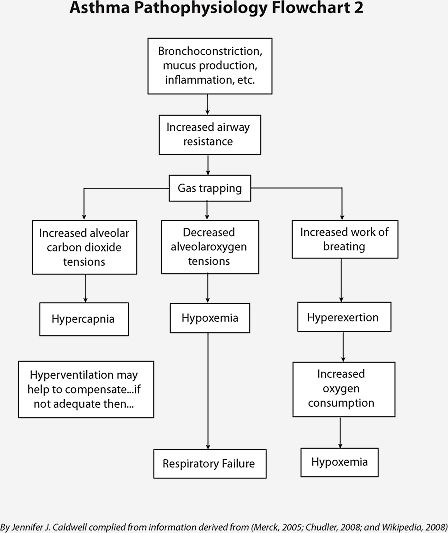
Asthma attack both adult and children of all ages This kills faster than any ailment if not urgently treated, by shortens your airway, making it difficult to breath. it mostly common in case of children.
THIS IS A LIVE TESTIMONY OF A FATEFUL COSTUMER WHO HAS SEEN THE EFFICACY OF THIS MEDICINE
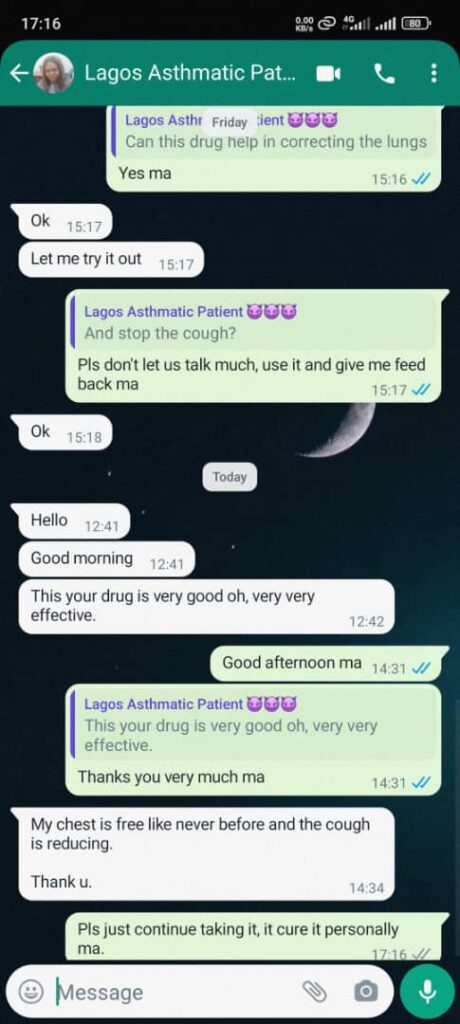
TYPES OF ASTHMA
- Allergic asthma: Allergic asthma is a breathing condition where the airways you breathe through tighten when you inhale an allergen, Eg, frying thing, car smoking, dust, sawmill dust etc.
- Aspirin-induced asthma: Aspirin and other NSAIDs can induce bronchospasm and, in rare cases, this reaction can lead to death in aspirin-sensitive asthmatics. This reaction is generally referred to as aspirin-induced asthma. The reported incidence varies widely affecting between 8% and 20% of adult asthmatics.
- Cough-variant asthma: Like “classic” or “typical” asthma, no one really knows what causes cough-variant asthma. However, coughing may start after people are exposed to allergens, or when they are breathing in cold air. Coughing may also follow an upper respiratory infection.
- Exercise-induced asthma: when the airways narrow or squeeze during hard physical activity. It causes shortness of breath, wheezing, coughing, and other symptoms during or after exercise. The medical term for this condition is exercise-induced bronchoconstriction, which if not urgently attended to might lead to sudden death.
- Nighttime asthma: This is the kind of asthma that worse during sleep at night, but there are explanations that include increased exposure to allergens, cooling of the airways; being in a reclining position; and hormone secretions that follow a circadian pattern. Sleep itself may even cause changes in bronchial function.
- Steroid-resistant asthma: Steroid misuse can cause acne,70–72 hair loss on the head, cysts, and oily hair and skin. Users who inject steroids may also develop pain and abscess formation at injection sites. Anabolic steroids can also produce jaundice, or yellowing of the skin or eyes, as a result of damage to the liver.
- Occupational asthma: Occupational asthma is a type of asthma. It occurs when you breathe in chemical fumes, gases, dust or other substances on the job. When that happens, it causes an allergic or immunological response. Occupational asthma is caused by breathing in substances at work, like dust, chemicals, fumes and animal fur. If you develop new asthma symptoms at work, or your childhood asthma comes back, you could have occupational asthma. You may be at your workplace for a while before you notice symptoms. occupational asthma is classified into two: [1] Sensitizer-induced asthma – caused by sensitization (reaction) to a substance.
[2] Irritant-induced asthma (also called reactive airways dysfunction syndrome, or RADS) which is caused by one specific, high-level exposure. - Difficult asthma: “difficult asthma” (also known as difficult-to-treat asthma or difficult-to-control asthma) is used for patients whose condition is uncontrolled despite GINA step 4 or 5 treatment.
- ‘Brittle’ asthma: Brittle asthma is a rare form of severe asthma characterized by a wide variation of Peak Expiratory Flow (PEF), in spite of heavy doses of medications. People with asthma typically experience inflammation and narrowing of the airways, which makes it hard for them to get air into their lungs. In brittle asthma, the symptoms are severe, often persistent, sometimes occur out of nowhere, and can be life-threatening.
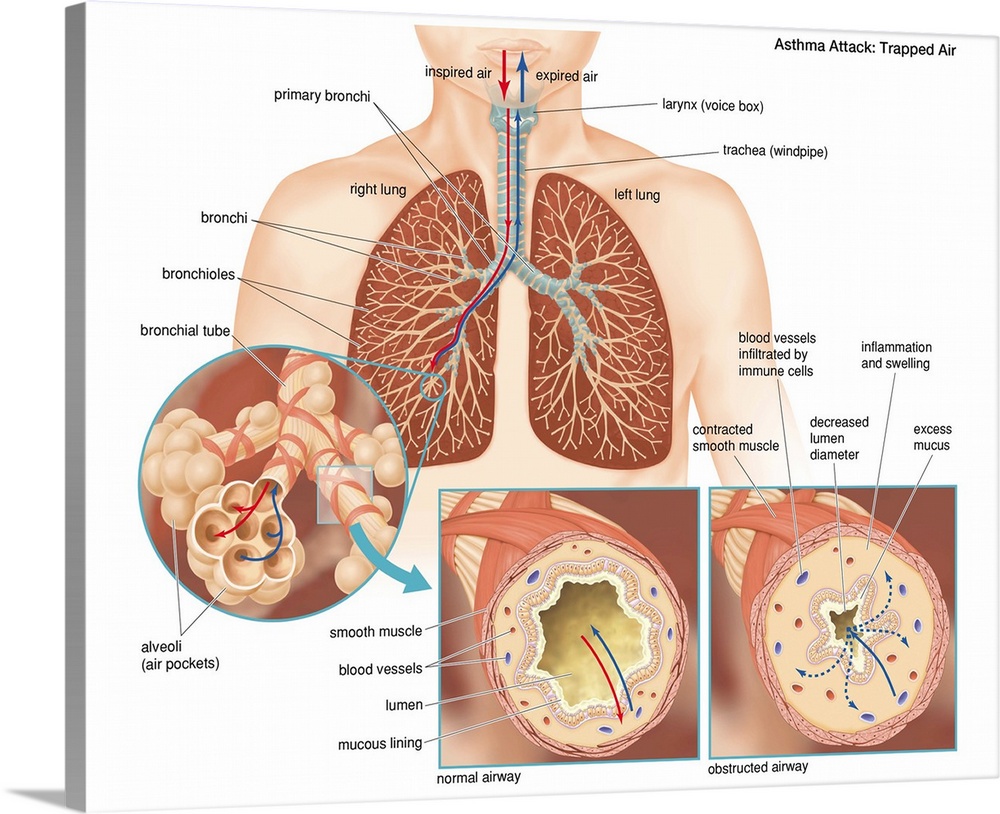
Allergic asthma : This is the most common form of asthma, affecting roughly 16 million people around the world. People with allergic asthma won’t experience an asthma attack until they come in contact with something they’re allergic to, such as dust, pet dander, mold, or pollen. Allergic asthma is triggered by allergies. Non-allergic asthma is triggered by irritants in the air. Cough-variant asthma is distinguished by a dry cough. Nocturnal asthma is worse at night.
Severe Persistent Asthma: This is the most acute type of asthma. Asthma patients at this stage will experience symptoms the entire day. Severe asthma is a type of asthma where symptoms are harder to control, even with high doses of medicines. It is the most serious and life-threatening type of asthma. In fact, severe asthma is considered a disability under the Equality Act.
Asthma in children
Asthma attack can be more dangerous and life threatening in the life of children, from the age of 1 to 10, as their their body tissues are more flexible than that of Adults.
Asthma can begin at any age, but it most often starts during childhood when your child’s immune system is still developing. Most children who get asthma have their first symptom by age 5. Asthma can cause your child to miss school and even end up in the hospital

Each year in the US, more than 300 children and young adults under 24 and more than 3,000 adults die of asthma—attacks that are often preventable
Over 80% of asthma-related deaths occur in low-and lower-middle income countries. The prevalence of asthma in Nigeria is high with approximately 13 – 15 million.
Signs Of Asthma in children
An Asthmatic child will always posses the following signs, or as a parent whenever you sense the following signs from your child, kindly bear in mind that your child is asthmatic. These are the first warning signs of asthma
The signs include the following:
- A whistling or wheezing sound when breathing out.
- Shortness of breath.
- Chest congestion or tightness.
- Frequent coughing that worsens when your child:
- Has a viral infection. Is sleeping. Is exercising. Is in the cold air.
- Being irritable.
- Coughing, especially at night or early morning.
- Breathing problems, such as shortness of breath, rapid breathing, or gasping for air.
- Feeling tired.
- Dark circles under the eyes.
An Asthmatic patients are 95.5% liable to the following diseases, if not urgently treated
- Allergic Bronchopulmonary: Allergic bronchopulmonary aspergillosis (ABPA) is an allergy or sensitivity to a fungus found in soil. In this condition, there is both an allergic and an inflammatory response to the mold. People with asthma are at a higher risk of getting ABPA.
- Chronic Obstructive Pulmonary Disease (COPD): COPD is a combination of lung diseases, such as chronic bronchitis and emphysema, that can make it hard to breathe. Its symptoms are similar to asthma. Smokers are at a greater risk of having both asthma and COPD.
- Food-Induced Anaphylaxis: Food is not a common asthma trigger. But your asthma can be affected by eating. Asthma can also make reaction worse if you have food allergies. Sulfites, found in certain foods and alcoholic drinks, many trigger asthma symptoms.
- Gastroesophageal Reflux Disease (GERD): Gastroesophageal reflux disease, known as GERD, is when stomach contents flow into the esophagus. It’s commonly known as “heartburn,” and it has been associated with a cough. It can trigger asthma symptoms.
- Nasal Polyps: Nasal polyps are small growths on the lining of the inside of the nose or sinus cavities. They are not cancerous. They are usually soft and painless. They are often caused by chronic sinus inflammation.
- Obesity: There is a strong connection between obesity and asthma. Obesity is linked to asthma development, as well as worsening symptoms and poor symptom control. People with asthma who are also obese may have less lung volume and may not respond as well to asthma medicines.
- Obstructive Sleep Apnea: Obstructive sleep apnea (OSA) is a condition that causes interruptions in breathing during sleep. Aside from sleepiness, it can create a higher risk for high blood pressure, heart attack, stroke and insulin resistance. OSA is a serious health risk.
- Sinusitis: Sinusitis is an infection or inflammation of the sinuses. When the tissue inside the sinuses swells, mucus increases. Infection with a virus causes most cases of sinusitis. Colds, bacterial infections, allergies, asthma and other health conditions can cause sinusitis. If the sinuses remain blocked for a long time, a secondary infection may develop.
Talk to your health care provider about your asthma and your triggers. Be sure to discuss any changes in your asthma management.
- Rhinitis: The word rhinitis means “inflammation of the nose.” The nose produces fluid called mucus. Postnasal drip occurs when more mucus drains down the back of the throat. Substances in the mucus may irritate the back of the throat and cause coughing. The postnasal drip can also irritate the airways, causing asthma symptoms.
- Respiratory Infections: Respiratory infections (also called respiratory illnesses) are common. These infections affect your lungs, nose, sinuses, and throat, especially when you have asthma. They can cause a runny nose, cough, fever, or sore throat
- Pregnancy: Asthma commonly occurs during pregnancy. Many women report that their asthma gets worse when pregnant. Because it can be serious, it’s important for pregnant women to have the right treatment plan. Pregnant women with severe asthma are more likely to have complications like low birth weight and high blood pressure (pre-eclampsia).
As manageable as it is, Asthma is a serious condition that can cause several problems leading to various medical complications, which eventually lead to dead, if not urgently or properly treated. In the wake of the on-going pandemic which has a deleterious effect on the airways, it is important, now more than ever to ensure that asthma is kept under control. We have had enough asthma deaths and so we must at this time unite our voices and our actions in putting up a fight to overcome this hurdles
Whenever sickness try ravaging the world, there are always some individuals or group of people who doesn’t rest until there is a permanent solution or remedy for it.
Here is an organic natural medicine carefully sorted by special gynecologist, for a total and permanent solution to all kind of asthma cough and asthma attacks, it also cure all kind of cough completely and permanently within short period of usage .

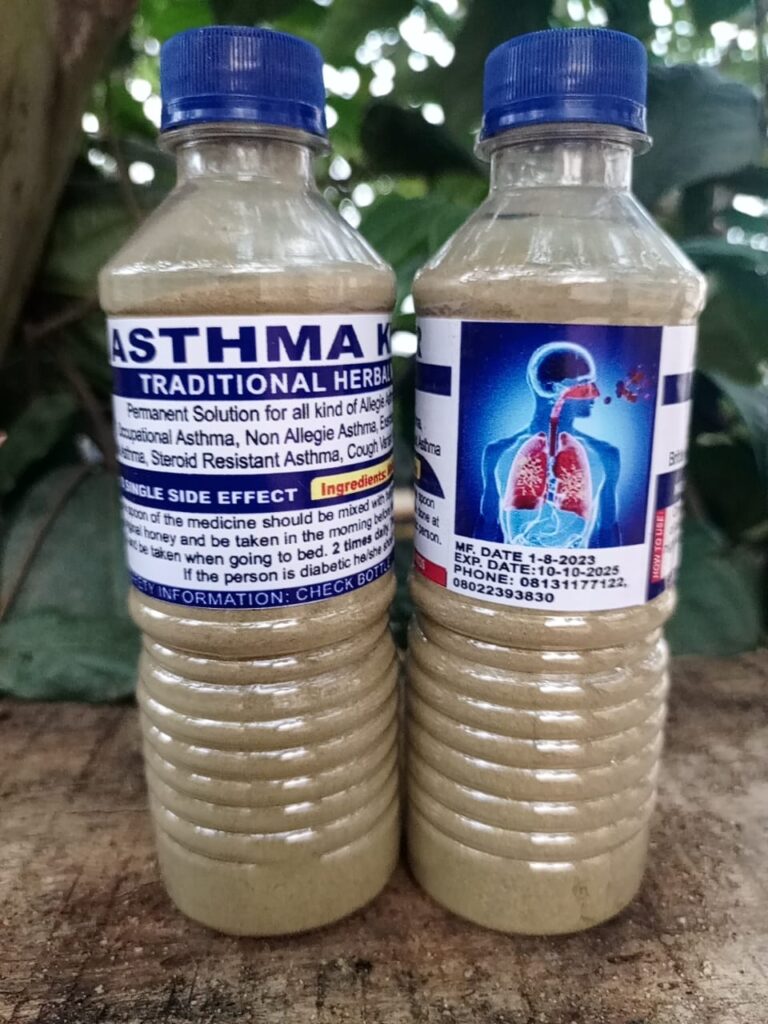

GREAT TESTIMONIES EVERYDAY

ASTHMA KILLER is a mixture of pure natural herbs and fruit which is why it is very effective and gives a permanent cure to all kinds of ASTHMA, regardless of the ages, and restore your health to its perfect condition.
PLEASE LISTEN CAREFULY ON HOW TO USE THIS WONDERFUL MEDICINE
ONE TABLE SPOON OF THE MEDICINE IS TO MIXED WITH HALF GLASS OF HOT WATER AND ONE TABLE SPOON OF ORIGINAL HONEY AND TO BE TAKING FIRST IN THE MORNING BEFORE EATEN FOR NON-DIABETIC
AND THE SAME SHOULD BE DONE LAST AT NIGHT AFTER MEAL
NOTE A DIABETIC PATIENT SHOUD NOT ADD HONEY TO IT AT ALL

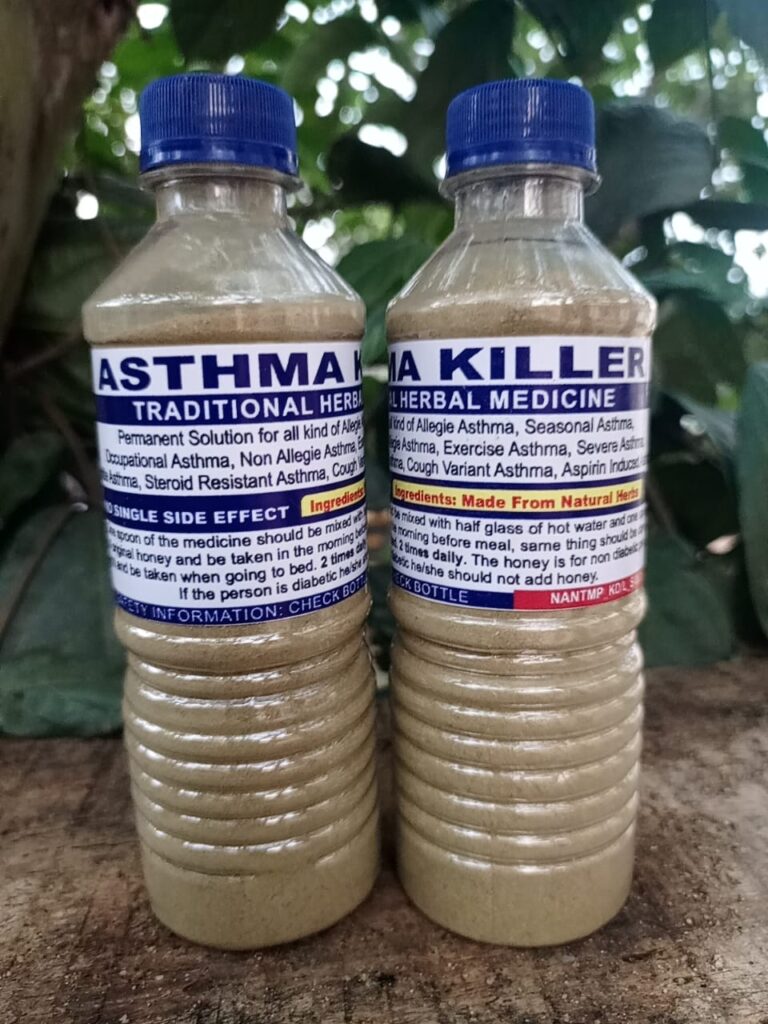

HERE ARE SOME CUSTOMERS FEED BACK ABOUT THIS ASTHMA KILLER TRADITIONAL HERBAL MEDICINE
MR RAHMAN MOHAMED [KASTINA STATE]
Wallahi, this medicine is good, I done use the medicine heal my cough patata Allah. Wallahi, if you get asthma go and use this medicine is very good.
MR ANTHONY OREGBU [DELTA STATE]
I will never stop recommending and adverting this product, this product save my wife life, in fact I’m looking for a means to locate the owner, if I can partner with them, I look for how to support the company.
This medicine is very good and effective.
MRS ADEBANJO KOLAWOLE [OGUN STATE]
Help me thank God for this medicine o.
I bought just two bottles for my dad and after 2weeks of usage he called me that the medicine is very good, that all the cough has stop completely,
God bless this company, I will never stop thanking this company for life.
MR CHIJIOKE [LAGOS STATE]
I was told that asthma doesn’t have cure by my doctor, but when I came across this medicine on facebook, I only decided to give a bottle a try, but before I could finish the bottle, I felt very good unimaginable change that made me to order more, sincerely now I’m ok.
MEDICAL PRACTIONER [ABUJA]

Please We Have Limited Quantity Left So Only Serious Buyers Should Complete This Form


